The Adondi and Other Life Forms of Adondus
The Adondi are the blue-skinned humanoids of the planet, Adondus.

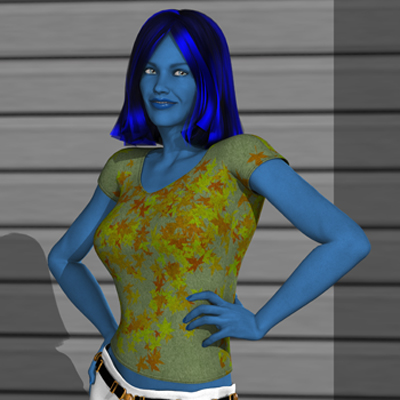
At the time of my novel, "Silver Threads," the Adondi civilization resembles England in the twelfth century, although the population is much smaller. They exist as two adjacent kingdoms, The Kingdom of Belmonte and The Kingdom of The Northlands. The kingdoms are separated by The River of Tears.
Because contact has been made by the Stellar Economic Community and a spaceport has been established at The City of Hope, the capitol of The Kingdom of The Northlands, some modern technology has been introduced into both kingdoms. However, social attitudes and their way of life remain relatively unchanged for many of the Adondi.
For reasons which will not become clear until the publication of my novel (in progress but on hold,) "Beyond the Windward Sea," the Adondi can successfully breed with humans and the female Adondi are distinctly bisexual. This latter fact is reflected in their marital laws and practices.
For genetic reasons, homosexuality and lesbianism (in the strict sense of individuals having no interest in the opposite sex, as opposed to bisexuality) are essentially nonexistent among the Adondi. Because the females are bisexual, male-female and female-female marriages are legal and are common.
The Adondi social structure encourages arranged marriages, so parents try to find socially or economically suitable brides for sons, and husbands or "brides" for their daughters. In addition, the marriage license is more than just a piece of paper providing a fee to the government, it is considered permission from the crown for the marriage to take place.
Children from male-female marriages are called "sanctioned heirs" and enjoy all inheritance rights. Although female-female marriages cannot produce offspring, children often result from extramarital liaisons. Such liaisons are socially acceptable, even expected. Because these children do not arise strictly from the family unit and because Adondi society is not only mildly patriarchal, but a monarchy, the children don't have the same legal standing as sanctioned heirs--neither the grandparents nor the crown approved the union which produced the children. Usually it makes no difference. However, if parents have a successful business or large financial resources to pass on, the crown may take more than a passing interest when the heirs are not sanctioned. Wealthy potential grandparents are more likely to try to find husbands for their daughters in an attempt to avoid undesirable legal entanglements in the future.
Because the male Adondi tend to be intelligent, large and well muscled, many find work off-planet as bodyguards, security personnel, or police. This is not to say that female Adondi do not escape the somewhat primitive life on Adondus by finding suitable occupations on other worlds.
Other life forms of Adondus include:
Blue-fin: A fish-like creature caught in the rivers and streams and used for food
Dormara: Elk-like animals used like horses for riding or beasts of burden. (The Ring)
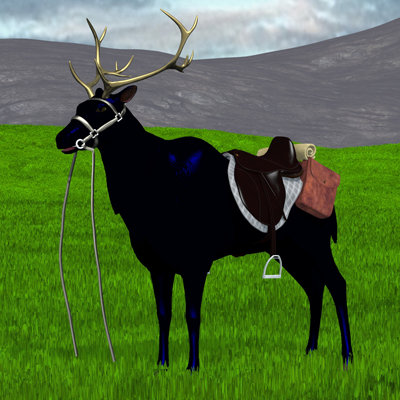
Dramadon: Pig-like animals that are hunted for food.(The Winds of Spring)
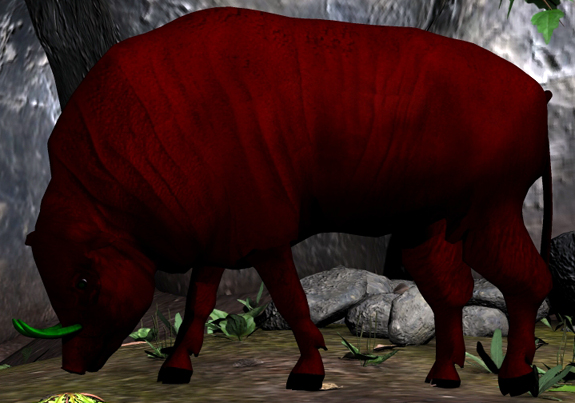
Juble: A plant which produces a wax from its leaves. (The Ring)
Forjanny: A thorny vine whose pink or red flowers have a pleasant smelling odor.
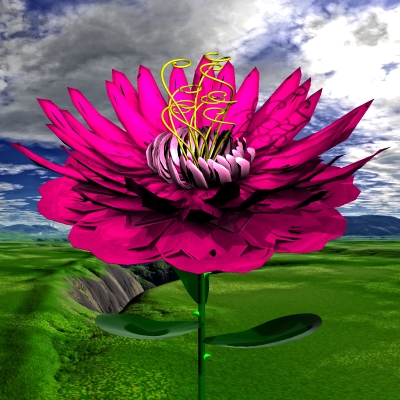
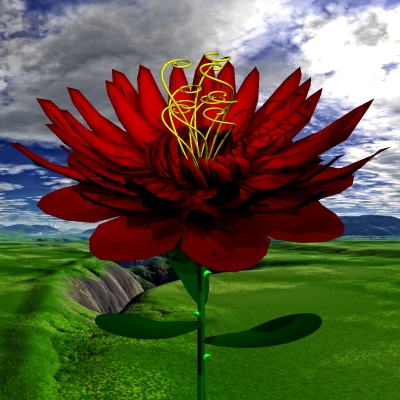
Kiliflower: A flowering vine with sharp thorns and blue flowers. It is often associated with the sayings attributed to Queen Amanda.
Pertabeast: A large, migratory herbivore, about the size of an elephant.
Tiny-thieves: Rat-like creatures.
Tweety Birds: A bird-like animal which, because of its song and beauty, has been domesticated by the Adondi. I say "bird-like" because, at first glance, tweeties (and other "birds" of Adondus) resemble Terrestrial birds. They have beaks but they do not posses true feathers. Most of their body is covered by a smooth, colorfully pigmented skin. Their wings and tails have somewhat rectangular projections which serve the same function as feathers.
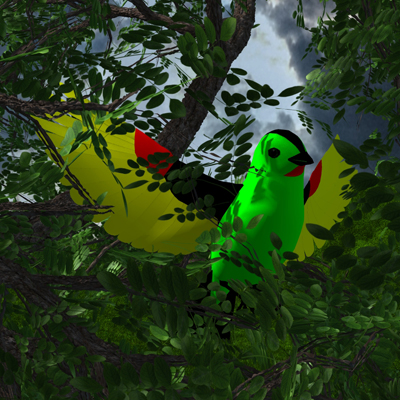
One of our assignments for the Creative Writing class that I took during Fall Semester 1998 at South Arkansas Community College was to write a short story filled with cliches. I'm not sure if the rationale was to get us so sick and tired of writing cliches that we would never use them again or to demonstrate to us that our writing wasn't as bad as it could be.
The title of my story, "The Life of RyaLee," was even based on a cliche. Like most of the pieces that I wrote for the class, this was set in The Stellar Economic Community (although I was yet to give it that name.) The tale took place at The Inn of the Blue Moon in the little town of The Crossroads, the Kingdom of Belmonte, on the planet Adondus. Naturally, the events occurred on a dark and stormy night
Caged tweety birds were kept at the bar and at each table. As far as the patrons were concerned, each little black, yellow, and green bird was there simply to provide entertainment, improvising elaborate dances to its own sweet melodies.
Unknown to the customers, the mistress of the inn, RyaLee, was also a royal intelligence officer. Periodically throughout each day, tweeties were taken to the aviary "for exercise." RyaLee would give each the command, "Sing." Each would sing before being allowed to go free in the aviary. To the untrained ear, each produced a sometimes longer, sometimes shorter, string of melodious notes. To the ears of the king's secret agents, the voices were compressed but clear. Each bird tweeted the conversations from its station in the restaurant. (Their tweets were not limited to 140 characters.)
Of course, on this night of all nights, RyaLee got an earful. Since then, RyaLee's name has been trimmed to RyLee and the story has gone through a number of revisions. It is now Chapter 11: The Life of RyLee, in my novel, Silver Threads.
I understand that a writer, Suzanne Collins, has a trilogy of novels and a movie (The Hunger Games) which uses a similar idea. The jaberjay, like the tweety, was used to spy on people and to repeat their conversations. As folks say, "There is nothing new under the sun."
Unlike the jaberjay, the tweety was not created in a government lab. Adondus was one of the New Taupoian Planets (designated as NTP 227) where the original ecosystems were replaced by Taupoian life forms as the planet was made ready for colonization. The tweeties were simply a minor part of this taupiforming process.
In the years after the ancestors of the Adondi were abandoned on NTP 227 (the story to be told in Beyond the Windward Sea) some of the wild tweeties were domesticated. They did not speak (like parrots, crows, or jaberjays) or mimic other birds (like mockingbirds) so their abilities were not discovered until nearly one thousand years later.
RyLee's still-future husband, Marcus, a cavalry officer and linguist, was camped with a friend under a tree where wild tweeties tended to nest and roost. He was dozing and in his dream-like state he heard the tweeties repeating his small talk. When he awoke, Marcus found that what he remembered was not just a dream. If he listened carefully, he could make out the repeated conversations.
When he returned to his headquarters, Marcus instigated the secret program of using domesticated tweeties for intelligence purposes.
The next time someone says, "A little bird told me," bear in mind that maybe one did.
Wooly fawns: Domesticated deer-like animals of the Adondi. They are about the size of a St. Bernard dog and covered by long, white hair.
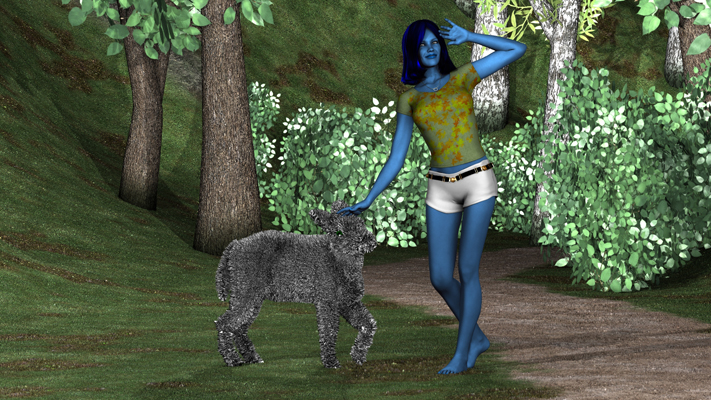
Page updated: 14 June 2019
Page created: 18 January 2012